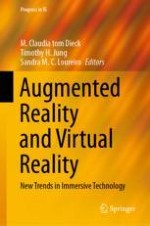2021 | OriginalPaper | Chapter
Using Virtual Reality as a Form of Simulation in the Context of Legal Education
Authors : Justin Cho, Timothy Jung, Kryss Macleod, Alasdair Swenson
Published in: Augmented Reality and Virtual Reality
Publisher: Springer International Publishing
Activate our intelligent search to find suitable subject content or patents.
Select sections of text to find matching patents with Artificial Intelligence. powered by
Select sections of text to find additional relevant content using AI-assisted search. powered by
